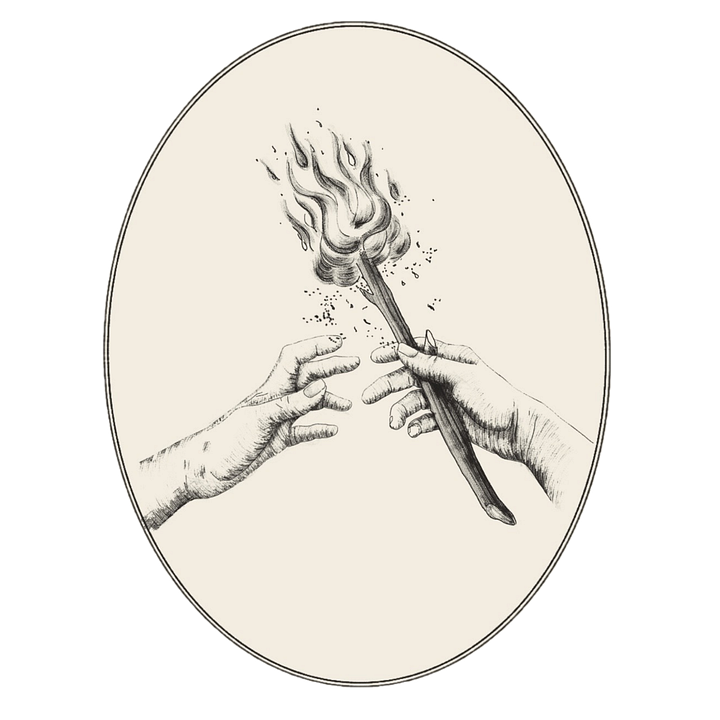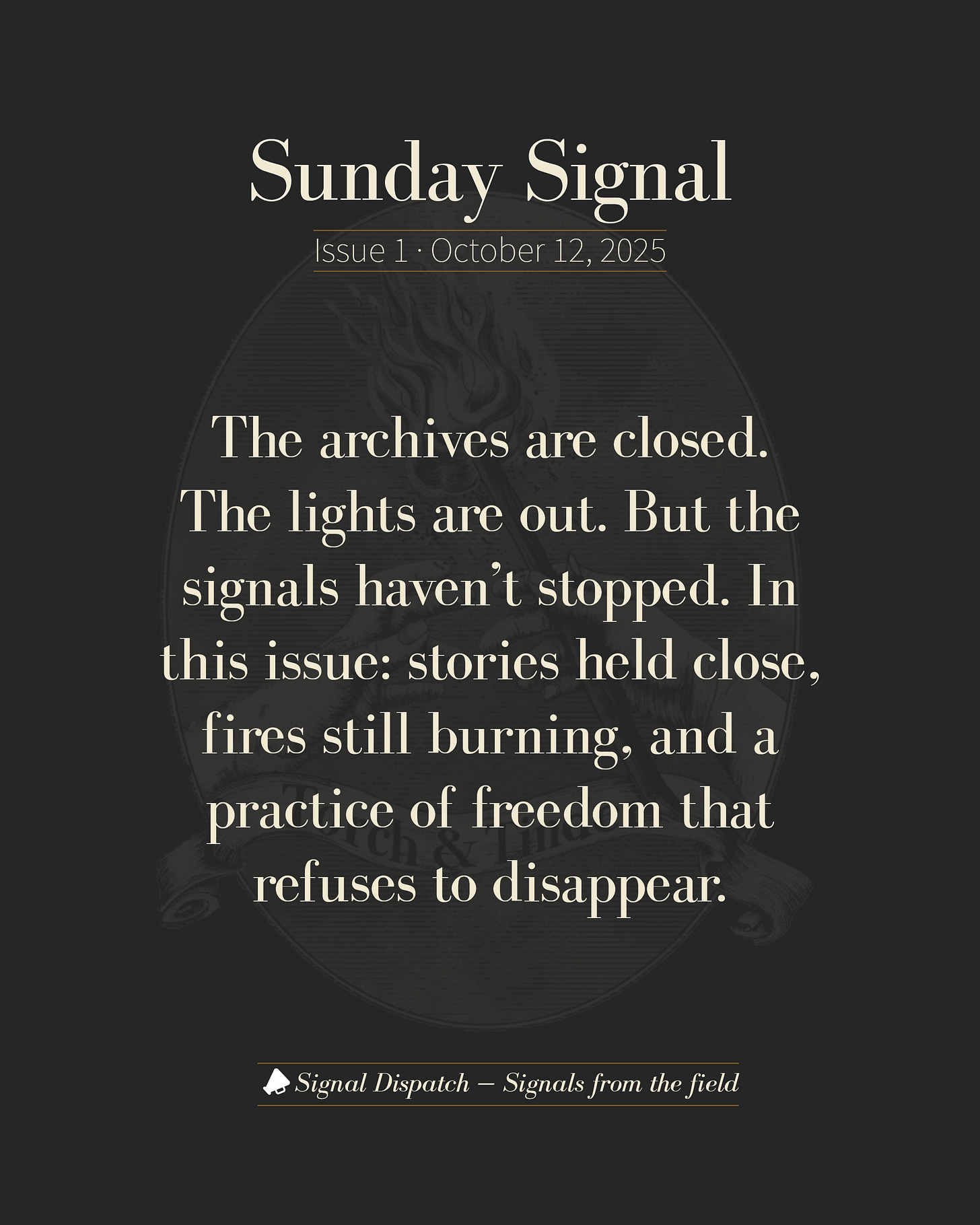Sunday Signal — Issue 1 · October 12, 2025
The archives are closed. The lights are out. But the signals haven’t stopped. In this issue: stories held close, fires still burning, and a practice of freedom that refuses to disappear.
📣 Signal Dispatch — Signals from the field
Issue 1 · October 12, 2025
Welcome to the first edition of Sunday Signal, from Torch & Tinder Press.
This issue opens with a clear signpost: when the government stalls, so do the systems meant to preserve public memory.
In The Front Matter, Shutdown and Shut Out examines how the shutdown is silencing archives, shuttering cultural institutions, and sidelining the very people tasked with keeping history alive.
In our feature column, The Imprint, When Government Fails zooms out from the headlines to explore the slow erosion of trust and the myth of state permanence. What happens when the public disappears—not by force, but by neglect?
From there, we turn outward: Echoes from the Ecosystem amplifies signals from our allies across the resistance landscape. In Kindling & Compass, we spotlight tools, guides, and hard-won knowledge for staying grounded and equipped.
You’ll also find a look ahead in The Advance Sheet, contributor updates and submission calls in Margins & Markup, and a personal reflection in Shared Heat, where we name the work behind the scenes and give thanks to those carrying the torch with us.
Sunday Signal is your campfire. A place to gather, to reflect, and to carry the flame forward.
THE FRONT MATTER
Shutdown and Shut Out
The lights are out, but the silence speaks. What began as a budget fight has become a reckoning over who keeps the story when the storytellers are sent home.
In a silent gallery, a curator turns off the lights. The hush feels heavier than absence. Museums shutter; park gates clamp. Federal workers across the country begin receiving dreaded notices: “Notice of Furlough.” What started as a political standoff has become a purge of public memory.
The Smithsonian, National Archives, and the National Park Service are all signaling closure. The Smithsonian, which used carryover funds to stay open through October 11, now confirms that exhibits and access will eventually halt if the shutdown continues.
The administration frames these cuts as “streamlining,” while critics call them sabotage. Thousands of employees, archivists, researchers, and custodians are being declared “nonessential.” Many now sit in enforced idleness, locked out of their offices, unable to access email or even check on the collections they have spent their careers protecting. The waiting itself becomes its own kind of labor, suspended between duty and dismissal, as the lights dim on their life’s work.
When culture and care are deemed nonessential, that is not cost-cutting. That is a worldview.
Congress remains deadlocked over funding. The Senate has repeatedly failed to advance a clean resolution to reopen the government, forcing both parties to stake out policy battles over subsidies and cuts. For Democrats, the balance they are trying to hold, protecting public goods while avoiding deeper collapse, is both laudable and nerve-wracking to watch unfold. In this stalemate, political inertia becomes its own tool, gridlock normalized, silence accepted, and cultural institutions caught in the crossfire.
These institutions are not optional. They are living records of who we are and what we believe. When they disappear, so does the possibility of shared narrative. The loss is both economic, staff without wages and programs suspended, and moral, the silence left in empty halls echoes longer than any closure notice.
Autocracy seeps in when public functions crumble, when memory becomes disposable and public infrastructure is hollowed out. This is not just a budget impasse. It is a test: do public goods matter? Do shared stories still hold weight?
A democracy that cannot keep its lights on cannot keep its promise. And when its keepers are sent home, whoever holds the pen writes the future.
Further Reading
Smithsonian Museums and National Zoo Set to Close Sunday for Remainder of Shutdown (Time Magazine)
Which D.C. Tourist Sites Are Closed During the Shutdown (NBC Washington)
Info Sheet: How Government Shutdowns Impact Museums and the Cultural Sector (American Alliance of Museums)
THE IMPRINT
When Government Fails
As federal paralysis deepens and troops patrol city streets, citizens turn to one another, rebuilding the public good by hand.
Across metropolitan corridors, a new order clanks into place. Paychecks are frozen. Food assistance programs stall. In their stead, soldiers in fatigues patrol avenues where teachers once walked. The Guard is being sent not for war but to fill the gaps of collapse, a sign not of stability but of decay.
In Chicago, armored vehicles idle near shuttered schools. In Portland, residents whisper about curfews that feel more like conditioning than control. The federal government insists these deployments are “temporary,” but history has never treated emergency powers kindly. Once the state turns to force to cover its weakness, the line between governance and occupation blurs.
When a government grows weaker, it often grows harder. That is the paradox of decline: failing institutions reach for the tools of coercion to mask their fragility. But where formal power cracks, informal power blooms. Across cities and small towns, mutual-aid networks stir back to life. Church basements host food shares. Libraries run on volunteer hours. Neighbors organize childcare for furloughed families. What begins as survival becomes renewal.
Every vacuum invites invention.
Mutual aid cannot print checks or rebuild bridges. But it preserves something more fundamental: dignity, the kind bureaucracy forgets how to measure. In that small act of sustenance lies a truth: the public good never belonged exclusively to government. It belongs to the people who keep it alive when government forgets what it is for.
Political philosophy teaches that public goods, like culture, infrastructure, and collective memory, exist only because we choose to sustain them together. Once a society allows their maintenance to rest solely with the state, it risks mistaking delegation for dependence. Systems thrive when citizens remain part of their upkeep. In evolutionary and social models alike, cooperation spreads most effectively where trust and connection endure. When those bonds weaken, neglect becomes contagious. The health of the commons depends on the resilience of the networks that carry it, people willing to share the weight, pass the flame, and guard against both decay and domination.
Resistance carries risk. Community energy depends on the same people already stretched to breaking, caregivers, teachers, organizers, the working poor. Without support, even the strongest networks fray. Without coordination, they risk isolation. Without protection, they risk suppression. The same administration that fails to pay its workers may still find funds to surveil those who fill the void.
Yet resilience is contagious. In every storm, people learn again that solidarity is not charity, it is infrastructure. The more the official scaffolding crumbles, the more visible that truth becomes. The task now is not to romanticize collapse but to build new capacity in the cracks of the old.
If the state falters, the commons must not.
What fills the vacuum of failure will decide what rises from it, a forced order or a living community.
Out there, someone is lighting another small fire, and from that ember, another story begins.
Further Reading
What to Know About Trump’s National Guard Deployments in Chicago and Portland (PBS NewsHour)
National Guard Troops Arrive in Chicago as Residents Brace for Extended Shutdown (The Guardian)
Public Goods (Stanford Encyclopedia of Philosophy)
Cooperative Behavior Cascades in Human Social Networks (Fowler & Christakis)
ECHOES FROM THE ECOSYSTEM
The Torch & Tinder cultural resistance ecosystem is a constellation of allied projects, each building freedom through its own craft. Together they form part of the living network of cultural resistance that surrounds the press, connecting practice to purpose and imagination to action. Here, we share glimpses and insights from our ecosystem partners.
The Happy Medium Sustainability Collective (HMSC): A Celebratory Experiment in Self-Governance
HMSC is developing a self-governance model founded on a hybrid sociocratic framework, blending consent-based decision-making with nonprofit accountability. The team is currently drafting bylaws that fully reflect their values of regeneration, equity, and shared stewardship.
One of the more complex aspects of implementing a consent-based framework is reconciling the sometimes-competing logics of majority and minority rule; especially when consequential decisions are at stake. Rather than defaulting to efficiency or hierarchy, HMSC treats each challenge as an opportunity to practice its values in real time: listening longer, responding slower, and designing systems that grow from dialogue instead of decree.
You can find HMSC on Facebook.
Ember Commons: Co-Creating Freedom, One Workshop at a Time
Now entering week five of their workshop How to Build a Plane While Flying It, Ember Commons continues to explore the art of co-creation in real time. They’re also expanding their workshop calendar for the remainder of the year, offering new opportunities for learners and educators to practice curiosity as a form of freedom.
Ember Commons builds its programming in full awareness of the lineage it inherits: a long continuum of educational scholarship, experimentation, and care. Drawing inspiration from forebears and contemporaries alike, the school walks in the footsteps of Paulo Freire, the Highlander Folk School, bell hooks, and all those who practiced liberation in their living rooms and classrooms: Mom, Dad, Nana, and Papa, and countless others who taught that freedom begins with learning together.
You can find Ember Commons on Facebook.
Each partner carries part of the fire by building structures that make resilience possible and proving that community itself is a form of resistance.
Want to Join Our Ecosystem?
Does your group or project need a safe, intentional space to work online? Consider joining us at Refuge Bonne Foi, an independent digital campus where allied projects gather to study, build, and grow.
Each ecosystem partner hosted at the Refuge receives a private project space customized to its needs. By default, unaffiliated Refuge members can view only your Welcome channel (ensuring autonomy and safety) while designated roles make it easy for your team to onboard new collaborators. Server management and moderation are handled by the Refuge Caretaker and Groundskeepers, and all partners have access to the Refuge Research Desk. You’ll also be invited to join regularly scheduled Project Circles, where members from across the ecosystem come together to share insights, challenges, and support.
All Refuge members are invited (never required) to explore the wider campus, engage across projects, and take part in shared community spaces—the living practice that links all our work.
To begin the process, please review The Ethos of Embers & Ash. If it resonates with you, send a brief introduction about your group or project and why you’d like to work at the Refuge to: info@torchandtinder.org.
KINDLING & COMPASS
Each week, we spotlight organizations keeping the tools of resistance sharp and accessible.
Center for Story-Based Strategy: Narrative Power Tools
The Center for Story-Based Strategy teaches how to turn dominant narratives inside out. Their “Battle of the Story” framework helps communities shift public imagination into an effective narrative resistance strategy.
Electronic Frontier Foundation: Surveillance Self-Defense
The EFF’s Surveillance Self-Defense Guide remains one of the most trusted resources for digital privacy and security. Clear, current, and practical, the EFF’s work proves essential reading for any writer, activist, or citizen navigating the age of algorithmic surveillance.
These are not endorsements; they’re signals. Lights in the same constellation of freedom.
THE ADVANCE SHEET
What’s rising from the press this week.
Torchlight Praxis – Tools you can carry
Our next Torchlight Praxis series, The Four Domains of Cultural Resistance, begins this week. It explores how narrative resistance, economic resistance, community resistance, and personal resilience form the framework of sustained freedom. The series draws from What Are We Supposed to Do? Practicing Cultural Resistance and adapts its lessons for everyday practice.
Embers Quarterly – Warmth for the long winter
Our editors are curating this week’s Embers feature from recent contributor submissions—essays, poetry, and art that examine shared freedom. The next feature is scheduled to drop Friday.
Keep watch for these releases by subscribing.
MARGINS & MARKUP
Press News and Calls for Action
Submissions
Submissions for Embers are currently open and we will soon begin accepting submissions for Torchlight Praxis (Tools You Can Carry) and Signal Dispatch (Signals from the Field).
Writers, artists, and journalists interested in cultural resistance, resilience frameworks, or reports from the ground: stay tuned for full guidelines next week.
Join the Team
TTPress is seeking volunteer staff members to help shape the press from the ground up. Roles include editorial support, communications, research, and community engagement.
If you believe freedom is a practice and publishing is resistance, we’d love to work with you.
SHARED HEAT
A Reflection From the Founder
The first Torchlight Gathering wasn’t just a test run. It was a shift.
I gave a keynote, but what mattered came after: the questions people brought, the insights they offered, the willingness to step into something not yet finished. What mattered was the shared sense that the story isn’t over, and maybe we can help carry it forward.
That same current runs through the first two contributor features we’ve published at Torch & Tinder. Samantha Terrell’s Braving Ruin holds steady in the face of loss. Her poems don’t perform. They stay present. Musgo’s Speak Out Loud is precise and unflinching; the kind of art that doesn’t beg to be seen but doesn’t let you look away either.
These weren’t just strong individual works. Together, they reflect the theme that’s guiding this first season of Embers: Shared Freedom. A freedom that makes space for grief, precision, honesty, and mutual recognition.
Torch & Tinder is a fire circle. A way to hold space for the commons and for the signals from the edges. A place where more and more of us seem to be finding ourselves. And where too many are willing to turn those edges into stages for fear, blame, and spectacle. Indeed, for The Other.
We’re here to push back on that with memory, with craft, and with care.
And there’s a lot of care going on behind the scenes. Between setting up our production calendar, building financial trackers for upcoming anthologies, reading and responding to submissions, seeking out volunteers, and prepping for what comes next—it’s been busy. But it’s good work. And we’re not doing it alone. We’re learning from and growing with our partners, our contributors, and you. Thank you for helping us build something that’s resilient, generous, and rooted in shared purpose.
Finally, a special thanks to our Art Director, Bobbi Sue, whose hand brought our new logo to life and whose vision continues to shape the press into something all its own. That symbol is already doing what we hoped it would: speaking clearly without needing to shout.
If you’re holding something—a story, an image, a signal of your own—you’re not alone. The torchlight’s moving. We’re building this together.
Send us your submissions. Volunteer for our staff. Or if you’d rather just support the work from where you are:
You can become a paid subscriber on Substack, or
send a one-time contribution on Ko-fi.
Every ember matters. And it’s your generous warmth that keeps ours glowing.
Thank you for all that you do.
—Robert Daniel, Founder, Torch & Tinder Press





Explore more from Torch & Tinder Press
📣 Signal Dispatch — Signals from the field (you’re here)
🔧 Torchlight Praxis — Tools you can carry
🔥 Embers — Warmth for the long winter
Stay connected: Instagram · Bluesky · Facebook
One-Time Support & community editions: Ko-fi
Support the work:
Subscribe free on Substack to receive every post.
Become a Paid Subscriber ($8/month or $80/year) to help fund print releases and join Refuge Bonne Foi.
Join as a Torchbearer ($240/year) for early access to Core Collections and digital issues.
Group discounts: 20% per seat (min. 3).
Prefer a one-time gift? Support us on Ko-fi.














